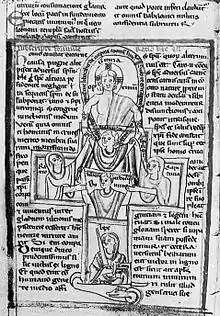Conrad of Hirsau
Conrad of Hirsau or Hirschau (Latin: Conradus Hirsaugiensis; c. 1070 – c. 1150) was a German Benedictine monk and writer. He is known for his literary work Dialogus super auctores, an accessus ad auctores written about 1130.

Conrad identified himself as a "modern" in literary terms. His Dialogus is "the only theoretical discussion of the technique of the accessus [ad auctores] that has come down to us from medieval times". His own selection of authors consists of Aesop (actually the versifier Phaedrus), Avianus, Boethius, Cato, Cicero, Donatus, Homer, Juvenal, Lucan, Ovid, Persius, Prosper, Prudentius, Sallust, Sedulius, Statius, Virgil and Theodulus.[1][2]
References
- Edwin A. Quauin, "The Medieval Accessus ad Auctores", Traditio, Vol. 3 (1945), pp. 215–264.
- Stephen M. Wheeler, "Introduction", in Accessus ad auctores: Medieval Introductions to the Authors (Codex latinus monacensis 19475) (Mediaeval Institute Publications, 2015), pp. 1–24.
Bibliography
- A. Stuber, Conradi Hirsaugiensis Dialogus super Auctores sive Didascalon (Wurzburg, 1889)
- Dialogus super auctores, Collection Latomus, XVII (Brussels, 1955) editor R. B. C. Huygens
- The Cambridge History of Literary Criticism Volume 2, The Middle Ages edited by Alastair Minnis and Ian Johnson
- Leslie G. Whitbread, Conrad of Hirsau as Literary Critic, Speculum, Vol. 47, No. 2 (Apr., 1972), pp. 234–245
External links
This article is issued from Wikipedia. The text is licensed under Creative Commons - Attribution - Sharealike. Additional terms may apply for the media files.